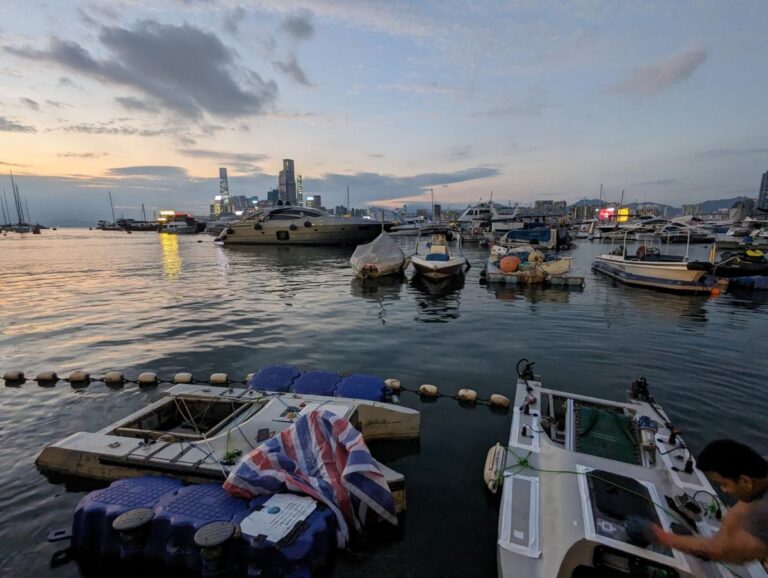Hong Kong-based marine technology startup Clearbot plans to launch a new generation of larger, solar-powered autonomous boats to boost efforts to clean up India's contaminated waters.
Clearbot's latest self-driving electric boat is scheduled to be deployed in March and will have the capacity to collect around 500kg of plastic waste and other debris from the ocean. This is twice the capacity of the company's floating robot vacuum cleaners currently operating in India's oceans and lakes.
The startup, founded by graduates of the University of Hong Kong, aims to electrify the marine services industry, said co-founder and chief technology officer Utkarsh Goel.
Do you have questions about the biggest topics and trends from around the world? Find your answers with SCMP Knowledge. SCMP Knowledge is a new platform of curated content with explainers, FAQs, analyzes and infographics brought to you by our award-winning team.
“We want to build a boat that will do this dirty work that is happening right now. [manned, diesel] We will automate boats around the world and make them more sustainable,” Goel said in an interview.
Founded in 2019, Clearbot began as a student project to help Indonesian surfers efficiently clean waterways as local residents were unable to deal with the flow of trash. This project led Goel and his co-founder Sidhant Gupta to understand the demand for sustainable infrastructure in the marine services industry around the world.
Over the past year, Clearbot has deployed 13 boats capable of collecting up to 250 kg of plastic waste per day to work on projects in Hong Kong and India, Goel said. The self-navigating electric vessel collects waste from the water surface and deposits it in a designated area for collection and recycling.
According to a study published in the journal Science Advances in 2021, India accounts for about 13% of all plastic in the world's oceans.
Clearbot conducted a pilot project in the northeastern Indian city of Shillong in September, demonstrating its ability to collect 600kg to 700kg of waste from a lake there in three days. A project is also underway in Bengaluru in southern India.
“Most of the growth we expect is in India. We are looking to scale there as there is enough demand,” Goel said.
“There is a lot of garbage in India” [in the waters]And this year, we look forward to making a big impact with the products we offer. ”
Clearbot has begun demonstrating a new large boat for commercial use in India and hopes to deploy it next year, Goel said.


A fleet of Clearbots in the port of Hong Kong. Photo: Clearbot alt = His fleet of Clearbots in the port of Hong Kong. Photo: Clearbot>
According to environmental organization WWF, at least 11 million tonnes of plastic enters the world's oceans every year, the equivalent of one truckload being dumped into the ocean every minute, and is harmful to marine ecosystems and humans. poses a major threat.
According to the United Nations, plastic makes up at least 85% of all marine waste.
The ocean helps mitigate climate change through its ability to capture carbon dioxide and store oxygen. According to the United Nations, they cover more than 70 percent of the Earth's surface, absorb about a quarter of all greenhouse gas emissions, and recover 90 percent of the excess heat generated by those emissions.
Pollution of the oceans not only damages marine biodiversity, but also the ability of natural ecosystems to act as carbon sinks, absorbing greenhouse gases from the atmosphere.
Clearbot uses solar energy rather than diesel to power its electric boats, so it produces no carbon emissions.
“There is a great potential for disruption in this area as current boats operating on all kinds of maritime missions are known to be highly polluted,” Goel said. “We want to be the leader in bringing about the electric revolution, just like Tesla did with cars.”
Clearbot rents boats on a fixed monthly or daily basis.
“We're doing this like any other maritime service. We're offering robots as a service,” Goel said. “We generated enough revenue to keep the business afloat and continue operating.”
In 2022, Clearbot began a one-year partnership with Sino Group to clean the developer's Gold Coast Housing Estate marina in Tuen Mun.
Sinoland said in its 2022 sustainability report that it was the first developer in Hong Kong to offer a testbed for autonomous cleaning boats.
A Sino Group spokesperson said: “We are actively discussing further collaborations to further strengthen our efforts to create a healthier and more sustainable future.”
Goel said Clearbot was valued at US$4 million in a seed funding round in September 2022, attracting backers including Alibaba Entrepreneurs Fund, Gobi Partners GBA and CarbonX Global.
“We are confident that Clearbot will continue to impact the marine services industry as we see the company commercialize innovative concepts into robotics-as-a-service solutions for enterprises,” said Cindy Chou, Executive Director of Alibaba. I'm convinced,” he said. The Hong Kong Entrepreneurs Fund said in a statement at the time.
This article originally appeared in the South China Morning Post (SCMP), the most authoritative news organization on China and Asia for more than a century. For more stories from SCMP, explore the SCMP app or visit SCMP on Facebook. twitter page. Copyright © 2024 South China Morning Post Publishers Ltd. All rights reserved.
Copyright (c) 2024. South China Morning Post Publishers Ltd. All rights reserved.


